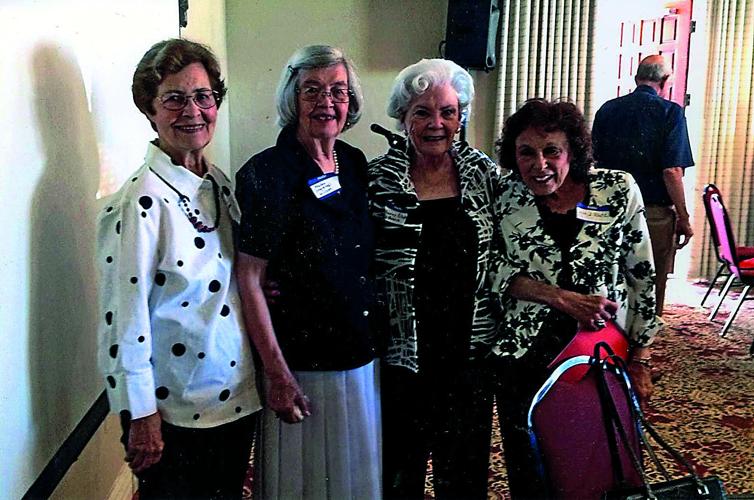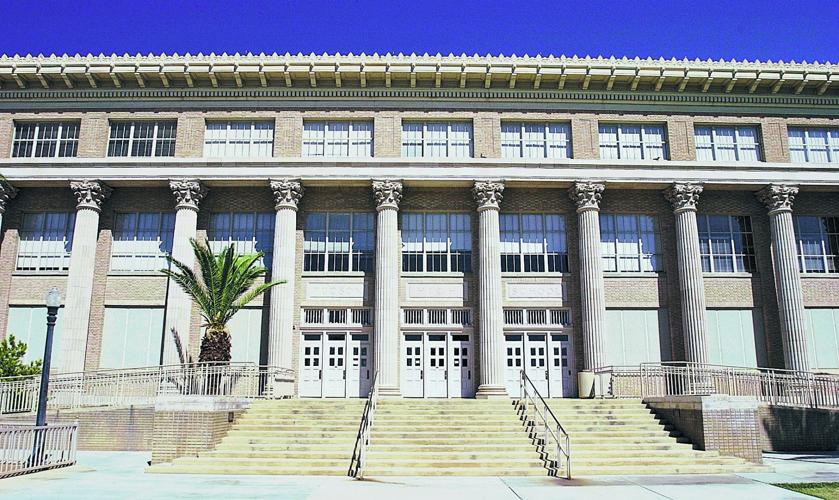Jo Margaret Wilson Morrison and Bonny Ritchie Soreck have been through almost everything together.
They carpooled to Tucson High School every morning. They went on to college and raised their children simultaneously, staying in touch even when Soreck moved to Northern California for 42 years.
Now 70 years since their high school graduation, they’re both back in Tucson and as close as ever.
“We’ve been friends for so long, but we always stayed in touch,” said Wilson Morrison, 87. “It’s amazing how we’ve done it.”
In April, they were among the 34 classmates from the Tucson High School Class of 1945 who celebrated their 70th reunion at the Westward Look.
Of the 409 graduates in that class, more than half are listed in a booklet with contact information so the class can stay in touch.
“Tucson High was the center of our lives and our entertainment,” said Wilson Morrison. “That’s why we’re still so involved with it.”
Only High School in Tucson
Established in 1892, Tucson High School was still the city’s only high school in the early 1940s. As a result, it was a “feeder school” that drew students from different parts of Tucson, said Cecilia Felix Roudebush, who was born and raised on the north side. She had never met kids from other parts of town until high school, but clicked with her peers immediately.
“They were just ordinary people,” said Felix Roudebush, 88. “In those years, we were just in school together, and we were all friends.” She thinks the class had success professionally because they were interested in what was going on in the world and became close because of World War II.
Felix Roudebush worked on the staff for Tucson High School’s quarterly magazine. She also remembers sitting in the stands for the football games. “When Mesa scored against us, we all sat there and cried,” she said.
After high school, she attended the University of Arizona and graduated with a degree in education. Robert D. Morrow, the head of the Tucson Schools District (now Tucson Unified School District), hired her and four other Tucson High grads. “They made a big to-do out of it,” Felix Roudebush said. “They took a picture of us on the steps of Tucson High.”
She taught 1C, or beginning English classes, at C.E. Rose Elementary School for six years, before moving to Chicago. There she was reunited with Vernon Roudebush, an optometrist whom she had met at a party in college. They married.
After stints in Phoenix and Milwaukee, Wisconsin, they moved back to Arizona and settled in Safford, before returning to Tucson 12 years ago. She’s kept in touch with her high school classmates by attending reunions and joining the planning committee.
While the group planned for the 70th reunion to be the final official get-together, its success might have changed their minds.
“We thought about it as our last reunion, but then there was talk about having another one,” Felix Roudebush said. “So, who knows? We might have another one.”
Changing times
Tucson High School wasn’t completely desegregated until 1951, but it was partially desegregated by Morgan Maxwell Jr.’s first year. He and the other black students had their own homeroom and marched in the back at graduation.
“It really did not bother me because all my classmates were friends,” said Maxwell Jr., 86. “A lot of them did not know that there was segregation.”
Maxwell was born in Okmulgee, Oklahoma. His family moved to Tucson in 1940 so his father could become principal of the all-black Dunbar Elementary School. After high school, he attended UA and graduated with a degree in finance before serving in the Army for three years.
When he returned, he earned an MBA in finance from the University of Southern California and started working on his doctorate before teaching at two historically black colleges. He moved back to Tucson in 1961 and worked in real estate.
While he developed relationships with Mo Udall, Frank Borman, and Gabrielle Giffords, among others, he said he’d still rather “talk about Tucson High,” because that’s where he met football coach Rollin Gridley.
Maxwell was a second-string defensive lineman for Tucson High School, which went undefeated during the Class of 1945’s three years in high school. During his senior year, he was the only black player to make a road trip for the 20-0 win against Douglas.
When the team went to eat at the Gadsden Hotel after the game, it was denied entry because of Maxwell. Gridley told the hotel “We’ll eat together,” so they went to a nearby supermarket and bought bologna sandwiches, which they ate in the parking lot.
“I’ve told that story to Jesse Owens (who retired and later died in Tucson),” Maxwell said. “He told me what Coach Gridley did for me was more than President Roosevelt did for him. … When he won four gold medals, he could not eat with the rest of the team.”
Maxwell has remained close with a lot of the members of Tucson High and is active in the reunion committee. He exchanges weekly emails, phone calls and letters with many members of the Class of 1945.
“We all share in our life’s history,” he said. “We are still together.”
Decorated Class
The Tucson High School Class of 1945 includes a general, an admiral and two Rhodes scholars, one of which was senior class president Larry McQuade.
“It was a very cohesive school,” he said. “We were a good mix of everybody. … We had some very competent people. Many years later I’m still impressed with the quality of people that were in my high school when I was there.”
McQuade was born in New York and moved to Tucson because of his brother’s health. During his senior year, he was an all-state defensive end for the football team, a pole vaulter for the track team and the president of the band as a clarinet player.
When it came time for college, McQuade’s mom made him apply to Yale University even though he wanted to go the University of Arizona to play football. He was accepted into and attended both because Yale didn’t begin until November.
Upon graduating from Yale in 1950, he was named a Rhodes scholar and earned his Master of Laws from the University of Oxford in England. He received his Juris Doctor from Harvard Law School and has been working for more than 40 years. His career included time as the assistant secretary of commerce during the John F. Kennedy and Lyndon B. Johnson administrations. He’s lived in Washington, District of Columbia; Chicago; and, now, New York.
McQuade credits Tucson High School and the character of Tucson for the success of his classmates. He’s stayed close with many of them despite living on the opposite side of the country.
While he wasn’t able to attend the reunion, he sent a message to the class that was read aloud.
“Probably every class should have this sense of pride, but I think our class does,” he said. “Every class should feel that.”
Hall of Fame
Established in 1982, the Tucson High Badger Foundation Hall of Fame was created to honor former students or faculty. The Class of 1945 has nine members, which is a tie for the most of any graduating classes.
One of those members is world-renowned exploration geologist David Lowell, 87, who was inducted in 2010.
While he described his time at Tucson High School as a “pleasant part of my history,” Lowell said he was shy and didn’t engage much past his participation on the football and track teams.
“I didn’t have time to engage very much in sociability,” he said.
Lowell went on to attend UA, where he played football, ran track and excelled in the classroom. He earned a degree in mine engineering and later furthered his education with a master’s degree in geology from Stanford University.
Since college, his discoveries have led to the development of more than 10 copper mines, including La Escondida in Chile, which is the largest copper mine in the world. He has worked in 44 countries.
As a result of his travels, he has only been able to attend five reunions. But he and his wife, Edith, who graduated from Tucson High in 1944, have become more connected since they moved to Rio Rico in 1990.
He attended the 70th reunion and called the atmosphere friendlier and more upbeat than any previous reunion they’ve attended. He credits Morgan Maxwell, who made an effort to keep everybody connected.
“He’s kind of the town crier,” Lowell said. “He’s done a very useful and generous thing of keeping track of everyone in the class.”
Golden girls
Jo Margaret Wilson Morrison was born in White Deer, Texas, and Bonny Ritchie Soreck in Clinton, Oklahoma. Their families moved to Tucson by the time the girls were in elementary school. They both dated athletes at Tucson High School and volunteered on a number of planning committees, helping out with sporting events, the annual and prom. Ritchie Soreck also acted in school plays.
After graduation, they attendedUA, but dropped out before finishing to marry. Wilson Morrison stayed in Tucson for all but nine years, while Ritchie Soreck got divorced, remarried and moved to San Carlos, California, for 42 years.
“My mother stayed down here, so I would visit once or twice a year,” said Ritchie Soreck, 87, who moved back to Tucson four years ago after her husband died. “And she would come up and visit and stay with us.”
The friends have remained involved with Tucson High, where Ritchie Soreck’s granddaughter just finished her freshman year. They’ve also helped planned all the reunions since graduation, including the 70th, in which Ritchie Soreck served as the master of ceremonies. Organizers asked for a $70 donation — $1 for every year since the graduation — which they donated to the nonprofit Badger Foundation.
“We’ve been close for so many years that it was great to see these people and that they would come after 70 years,” Wilson Morrison said.






